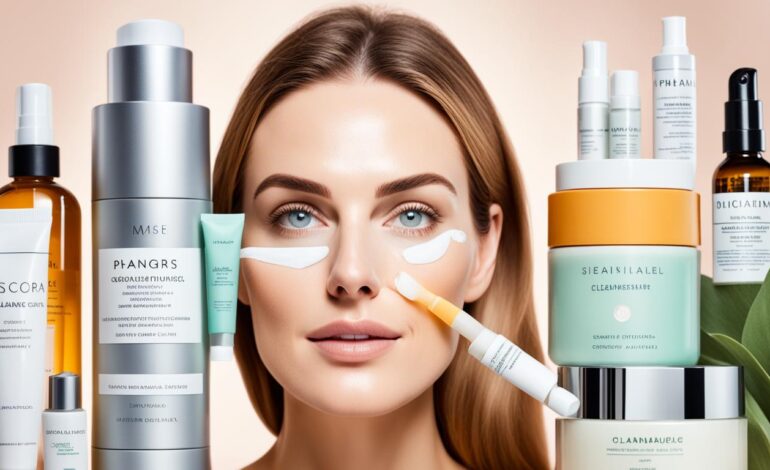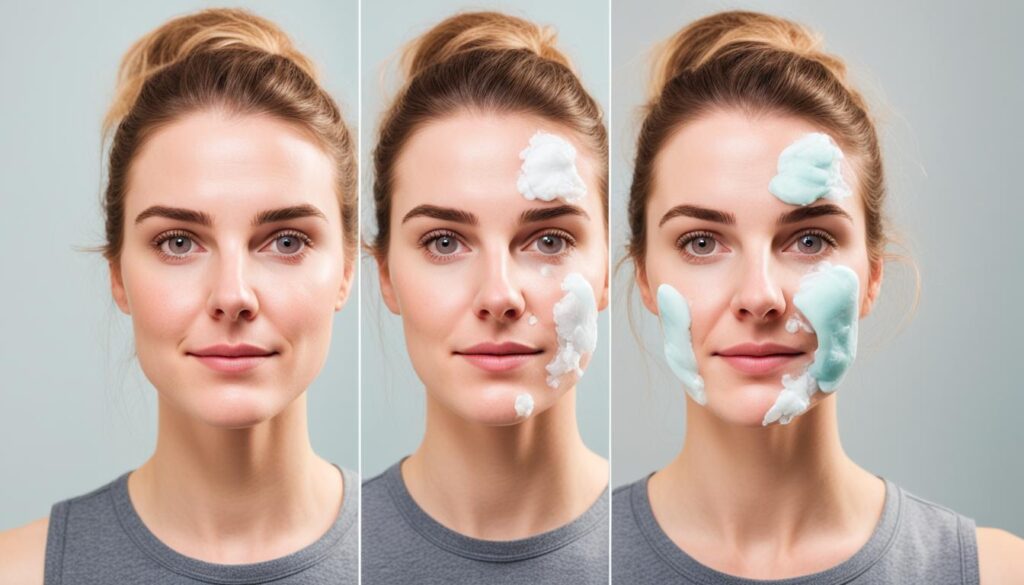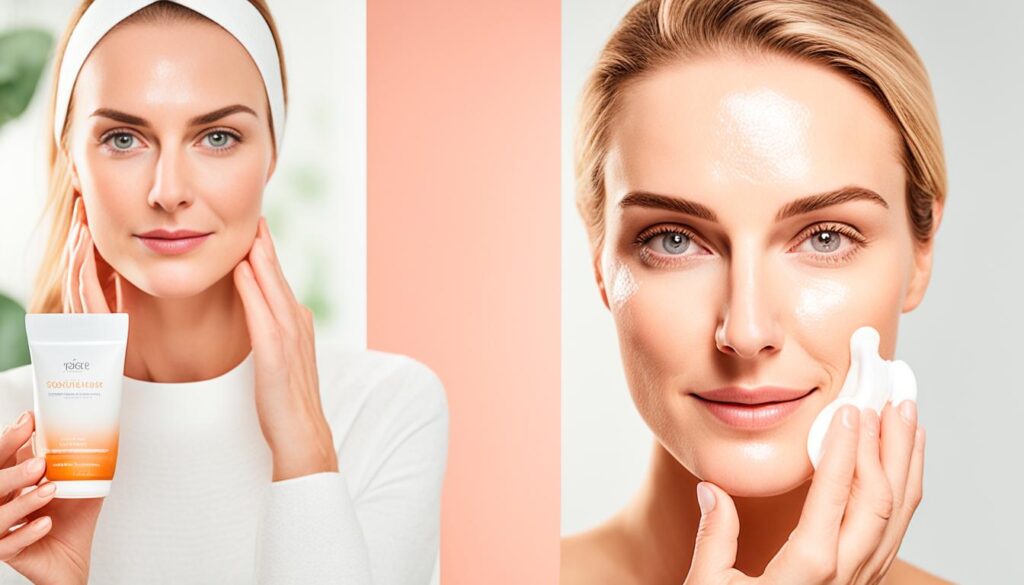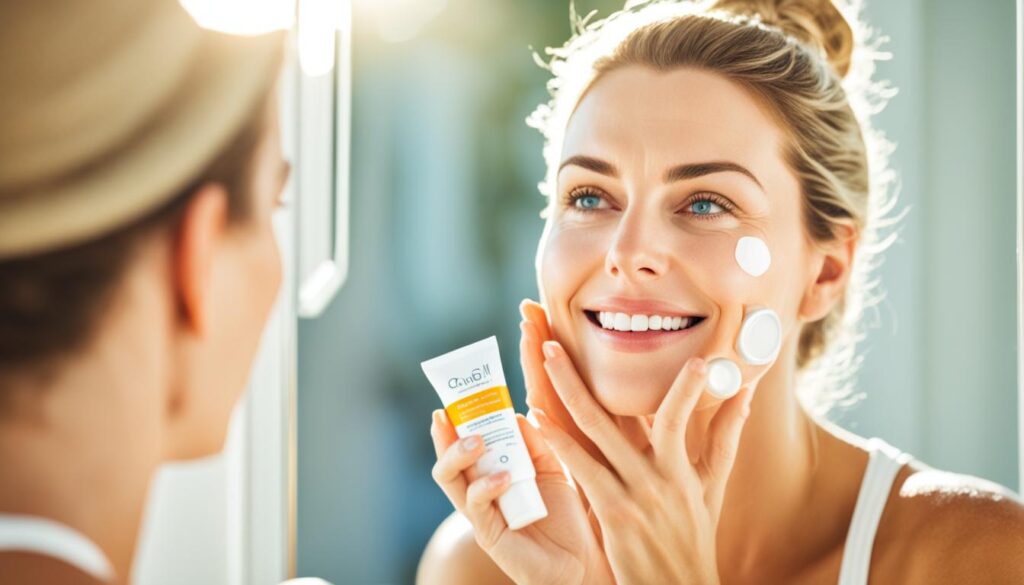Skincare Routine For Problematic Skin Essentials

Developing a skincare routine for problematic skin is essential to manage acne and promote clear, healthy-looking skin. In this article, we will explore expert-approved essentials for a skincare routine targeted towards acne-prone skin. We will discuss the importance of a thorough cleansing routine, the role of effective acne treatments, the necessity of sunscreen and moisturizer, and the benefits of incorporating hydrating and soothing ingredients in your skincare routine. By following these steps, you can improve the appearance of your skin and minimize breakouts.
Key Takeaways: Skincare Routine For Problematic Skin
- Building a skincare routine is crucial for managing acne-prone skin.
- A thorough cleansing routine helps remove excess oil and impurities from the skin.
- Effective acne treatments like salicylic acid and benzoyl peroxide target and treat breakouts.
- Regular use of sunscreen protects the skin from harmful UV rays and prevents acne scarring.
- Moisturizers with hydrating ingredients like hyaluronic acid and niacinamide help maintain the skin’s moisture balance.
Understanding Acne and its Causes
Acne is a common skin condition that affects many individuals, particularly those with acne-prone skin. It is characterized by various symptoms, including increased sebum production, clogged pores, inflammation, and the presence of bacteria. To effectively address acne, it is important to understand its underlying causes and contributing factors.
Also Read : Kids Skincare Routine Tips And Advice
The Role of Sebum Production and Clogged Pores
One of the primary factors in acne development is the overproduction of sebum, a natural oil that helps lubricate the skin. Excessive sebum production can lead to the accumulation of oil on the skin’s surface, resulting in clogged pores. Dead skin cells, along with sebum, can block the hair follicles, leading to the formation of various acne lesions.
Also Read : Ultimate Skin Care Routine For Dry Skin Tips
Inflammation and Bacterial Infection
Inflammation plays a significant role in acne development. When the hair follicles become clogged with sebum and dead skin cells, it creates an ideal environment for the growth of acne-causing bacteria, such as Propionibacterium acnes. This bacterial infection triggers an inflammatory response, resulting in the characteristic redness and swelling associated with acne.
Also Read : Optimal Skin Care Routine For Oily Skin Guide
Hormonal Imbalance and Acne
Hormonal imbalances, particularly elevated levels of androgens, can contribute to the development and worsening of acne. Androgens stimulate the production of sebum, leading to increased oiliness of the skin. Hormonal fluctuations, such as those that occur during puberty or the menstrual cycle, can disrupt the delicate balance of sebum production and contribute to acne breakouts.
Also Read : Top Foods For Healthy Skin – Glow Up Naturally!
Different Types of Acne Lesions
Acne can manifest in various forms, including blackheads, whiteheads, red bumps, papules, pustules, nodules, and cysts. Blackheads occur when the hair follicles are partially blocked, while whiteheads occur when the follicles are completely blocked. Red bumps, papules, pustules, nodules, and cysts are all different types of inflammatory acne lesions that result from the combination of sebum, bacteria, and inflammation.
Also Read : Body Skin Cares Routine Tips And Tricks
Understanding the Causes for Effective Treatment
By understanding the causes of acne, individuals can develop targeted skincare routines and treatment plans to manage and reduce breakouts. Addressing sebum production, reducing inflammation, and controlling bacterial growth are key factors in an effective acne management strategy.
Recommended Ingredients for Treating Acne

The best skincare routine for acne-prone skin often involves the use of certain active ingredients. These ingredients target the underlying causes of acne and help to regulate oil production, unclog pores, and promote skin healing. Incorporating these ingredients into your skincare routine can significantly improve the appearance of acne-prone skin.
Retinoid
Retinoids, such as Adapalene, are highly effective in treating acne. They work by regulating skin cell turnover, preventing the buildup of dead skin cells and clogged pores. Regular use of retinoids can help reduce acne breakouts and promote clearer skin.
Salicylic Acid
Salicylic acid is a beta hydroxy acid that effectively unclogs pores and reduces excess oil. It penetrates deep into the pores, dissolving the debris that contributes to acne formation. Incorporating salicylic acid into your skincare routine can prevent new breakouts and improve the appearance of existing acne.
Benzoyl Peroxide
Benzoyl peroxide is a powerful ingredient with antibacterial properties. It helps kill acne-causing bacteria and reduces inflammation. Benzoyl peroxide can be used as a spot treatment or as part of a larger skincare routine to effectively manage and prevent acne breakouts.
Sulfur
Sulfur is another ingredient known for its acne-fighting properties. It has antimicrobial effects and helps reduce excess oil production. Regular use of sulfur can help control acne breakouts and improve the overall condition of acne-prone skin.
Hyaluronic Acid, Niacinamide, and Ceramides
Hyaluronic acid, niacinamide, and ceramides are hydrating and nourishing ingredients that help support the skin barrier. They help replenish moisture, soothe inflammation, and promote skin healing. Incorporating products containing these ingredients into your skincare routine can help balance the skin’s hydration levels and improve its overall appearance.
By incorporating these recommended ingredients into your skincare routine, you can effectively target acne-prone skin and promote clearer, healthier-looking skin. Remember to be consistent with your skincare routine and consult with a dermatologist for personalized recommendations and treatments tailored to your specific skin concerns.
The Basic Steps of an Acne Skincare Routine

An acne skincare routine should consist of a few essential steps. First, it is important to use a gentle cleanser to remove dirt, oil, and makeup from the skin. Depending on your skin type, you may choose a cleanser with salicylic acid or benzoyl peroxide to target acne.
After cleansing, apply an acne treatment product, such as a serum or spot treatment, to address active breakouts. These treatments typically contain active ingredients like salicylic acid or benzoyl peroxide that help unclog pores and reduce inflammation.
Next, moisturize your skin with a non-comedogenic, hydrating moisturizer to maintain moisture balance and support the skin barrier. Look for a moisturizer that is specifically formulated for acne-prone skin and won’t clog pores. Ingredients like hyaluronic acid or niacinamide can also provide additional hydration and help soothe the skin.
Lastly, don’t forget to apply sunscreen to protect your skin from harmful UV rays, which can worsen acne and lead to skin damage. Look for a broad-spectrum sunscreen with an SPF of 30 or higher. Choosing a sunscreen that is oil-free and non-comedogenic will prevent it from clogging your pores.
By following these basic steps of an acne skincare routine – cleansing, treating, moisturizing, and protecting with sunscreen – you can effectively manage acne and promote a healthier complexion.
| Step | Product | Description |
|---|---|---|
| Cleansing | Gentle cleanser | Removes dirt, oil, and makeup |
| Treatment | Acne treatment product | Addresses active breakouts and reduces inflammation |
| Moisturizing | Non-comedogenic moisturizer | Provides hydration and supports the skin barrier |
| Sun protection | Sunscreen | Protects the skin from harmful UV rays |
The Importance of Consistency and Personalization in Acne Skincare
When it comes to acne skincare, consistency and personalization are key. Every individual has a unique skin type and specific concerns, and what works for one person may not work for another. That’s why it’s important to personalize your acne routine to cater to your specific needs.
Being consistent with your skincare routine is crucial for achieving optimal results. It’s easy to get discouraged if you don’t see immediate improvements, but it’s important to give your routine time to work. Consistency will help your skin adjust to the new products and treatments, allowing them to effectively address your breakouts and skin concerns.
To ensure that you’re using the right products and treatments for your skin, it’s highly recommended to consult with a dermatologist. They can assess your skin type, tolerance levels, and specific concerns, and provide personalized recommendations. They can also prescribe acne medications that are tailored to your needs, helping you achieve clearer and healthier skin.
In addition to personalized skincare, one of the simplest yet most effective steps you can take is to wash your face regularly. Cleansing your face twice a day, in the morning and at night, is essential for removing dirt, oil, and impurities that can clog your pores. By keeping your skin clean, you can minimize breakouts and promote clearer skin.
The Importance of Consistency and Personalization in Acne Skincare
| Key Points | Benefits |
|---|---|
| Personalization | Catering to individual skin types and concerns |
| Consistency | Allowing the routine to work over time |
| Consulting with a dermatologist | Expert recommendations and personalized acne medications |
| Regular face washing | Preventing clogged pores and minimizing breakouts |
By staying consistent with your acne skincare routine and personalizing it to your skin type and concerns, you can effectively manage breakouts and achieve clearer, healthier-looking skin. Don’t forget to consult with a dermatologist and wash your face regularly to optimize your results.
Additional Tips for Managing Problematic Skin

In addition to following the basic steps of an acne skincare routine, there are some additional tips that can help you effectively manage problematic skin. These tips include exfoliating dead skin, seeking advice from a dermatologist, and adopting a gentle skincare routine.
Regular Exfoliation
Exfoliating dead skin cells is an important step in preventing clogged pores and reducing breakouts. Exfoliation helps remove the buildup of dead skin cells that can contribute to acne. However, it’s crucial to be gentle with your skin during exfoliation to avoid irritation. Look for exfoliating products with gentle ingredients, such as salicylic acid or lactic acid, and use them according to the product instructions. Incorporate exfoliation into your skincare routine once or twice a week for best results.
Consult a Dermatologist
If over-the-counter skincare products are not providing the desired results, it may be beneficial to see a dermatologist. Dermatologists specialize in diagnosing and treating various skin conditions, including acne. They can assess your specific skin condition and recommend personalized skincare products and treatments tailored to your needs. Dermatologists may prescribe prescription-strength acne medications, such as retinoids or antibiotics, that can effectively target acne and help improve your skin.
Gentle Skincare Routine
Avoid using harsh or abrasive products on your skin, as they can aggravate acne and cause further irritation. Instead, opt for a gentle skincare routine that focuses on cleansing, treating, moisturizing, and protecting your skin. Choose skincare products that are specifically formulated for acne-prone or sensitive skin and are free from harsh ingredients like alcohol and fragrances. Look for non-comedogenic products that won’t clog your pores. Following a gentle skincare routine consistently can help maintain the health of your skin and minimize breakouts.
By incorporating these additional tips into your skincare routine, you can effectively manage problematic skin and work towards achieving a healthier complexion. Remember to be patient and consistent in your efforts, and don’t hesitate to seek professional guidance from a dermatologist for personalized advice and treatment options.
The Role of Sunscreen in Acne Skincare

Sunscreen is a crucial part of any skincare routine, especially for acne-prone skin. It plays a key role in protecting your skin from the harmful effects of UV rays and preventing sunburn and skin damage. Additionally, sunscreen helps reduce the risk of skin cancer, a serious concern for long-term skin health.
When it comes to acne, sunscreen can also help prevent acne scarring and minimize the appearance of post-acne dark spots. Excessive sun exposure can worsen acne scarring and hyperpigmentation, making it important to protect your skin with sunscreen.
When choosing a sunscreen for acne-prone skin, opt for a product with a high sun protection factor (SPF) to ensure optimal protection. Look for a sunscreen that is labeled as non-comedogenic, meaning it won’t clog your pores or contribute to excessive oil production.
Applying sunscreen as the final step in your skincare routine will help create a barrier between your skin and the sun, providing necessary protection throughout the day. Even on cloudy days or during the winter months, UV rays can still reach your skin, so it’s essential to make sunscreen a daily habit.
Remember to apply sunscreen generously to all exposed areas of your skin, including your face, neck, and any other areas that may be prone to breakouts or acne scarring. Reapply sunscreen every two hours, or more frequently if you sweat or engage in water activities.
Protecting your skin from UV rays is a proactive step towards preventing long-term damage, maintaining healthy skin, and reducing the risk of skin cancer. Incorporate sunscreen into your daily skincare routine to preserve your skin’s vitality and keep acne scarring at bay.
Step 2: Apply an acne treatment medication
STEP 3: Moisturize
Step 1: Wash your face — gently!
The Best Skincare Routine to Prevent Acne
Step 3: Apply a non-greasy moisturizer
Conclusion
Developing a skincare routine for troubled, acne-prone skin is essential for achieving clear and healthy-looking skin. By understanding the causes of acne and incorporating effective ingredients, you can effectively manage breakouts and improve your overall complexion. It’s important to follow a consistent and personalized skincare routine that addresses your specific skin concerns.
Consulting with a dermatologist can provide you with personalized recommendations and treatments tailored to your skin type and concerns. They can guide you on the best skincare products and acne medications to use for your troubled skin. Remember, patience is key, as it takes time for skincare routines to show results.
Incorporate products with active ingredients such as salicylic acid, benzoyl peroxide, and retinoids to target acne and promote clear skin. Additionally, don’t forget to protect your skin from the sun by using a sunscreen with a high SPF. By taking these steps and maintaining a consistent routine, you can achieve the clear and radiant skin you desire.
FAQs
Q: What is the importance of having a skincare routine for acne-prone skin?
A: Having a consistent skincare routine for acne-prone skin helps to manage excess oil and dead skin cells, prevent breakouts, and improve overall skin health.
Q: How should I cleanse my skin as part of a skincare routine for problematic skin?
A: When cleansing your skin for acne, use a gentle foaming cleanser to remove oil, dirt, and bacteria without stripping the skin of its natural oils.
Q: What are some essential steps for a morning skincare routine for problematic skin?
A: A morning skincare routine for acne-prone skin should include cleansing, applying an acne treatment, moisturizing with a non-comedogenic moisturizer, and always using SPF to protect your skin from sun damage.
Q: What are key ingredients to look for in skincare products for acne-prone skin?
A: Look for products containing salicylic acid, benzoyl peroxide, or retinol for acne treatment, as well as hyaluronic acid or ceramides for hydration without clogging pores.
Q: How can I address uneven skin texture in my skincare routine?
A: Incorporate exfoliating ingredients like AHAs or BHAs into your skincare routine to help improve skin texture and promote cell turnover for a smoother complexion.
Q: Should I seek advice from a dermatologist for my problematic skin?
A: Yes, consulting a board-certified dermatologist can help you tailor a skincare routine specific to your skin type and concerns, as well as provide recommendations for effective acne treatments.
Q: What are some common mistakes to avoid in a skincare routine for acne?
A: Avoid over-exfoliating, picking at blemishes, using harsh products that strip the skin, and skipping moisturizer, as these can exacerbate acne and irritation.





